Visitor Attraction Management
VerifiedAdded on 2020/06/03
|16
|4243
|46
AI Summary
This assignment explores the intricacies of visitor attraction management using the National Maritime Museum in Greenwich as a case study. It delves into relevant literature surrounding visitor attraction management best practices, stakeholder involvement, experience value, and challenges faced by attractions. The analysis examines various aspects of the museum, including its history, offerings, target audience, and sustainability efforts, drawing upon research and real-world examples to provide a comprehensive understanding of effective visitor attraction management strategies.
Contribute Materials
Your contribution can guide someone’s learning journey. Share your
documents today.
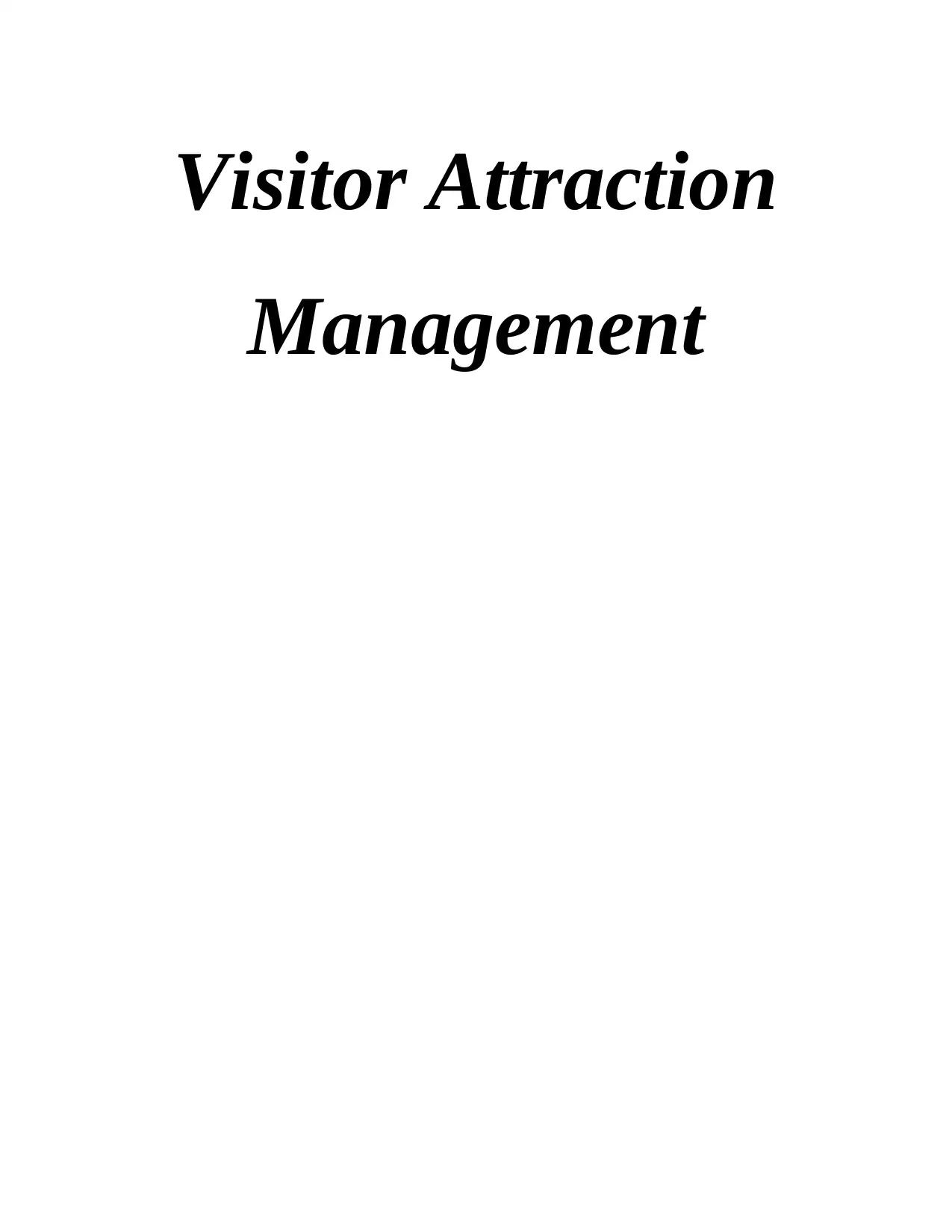
Visitor Attraction
Management
Management
Secure Best Marks with AI Grader
Need help grading? Try our AI Grader for instant feedback on your assignments.
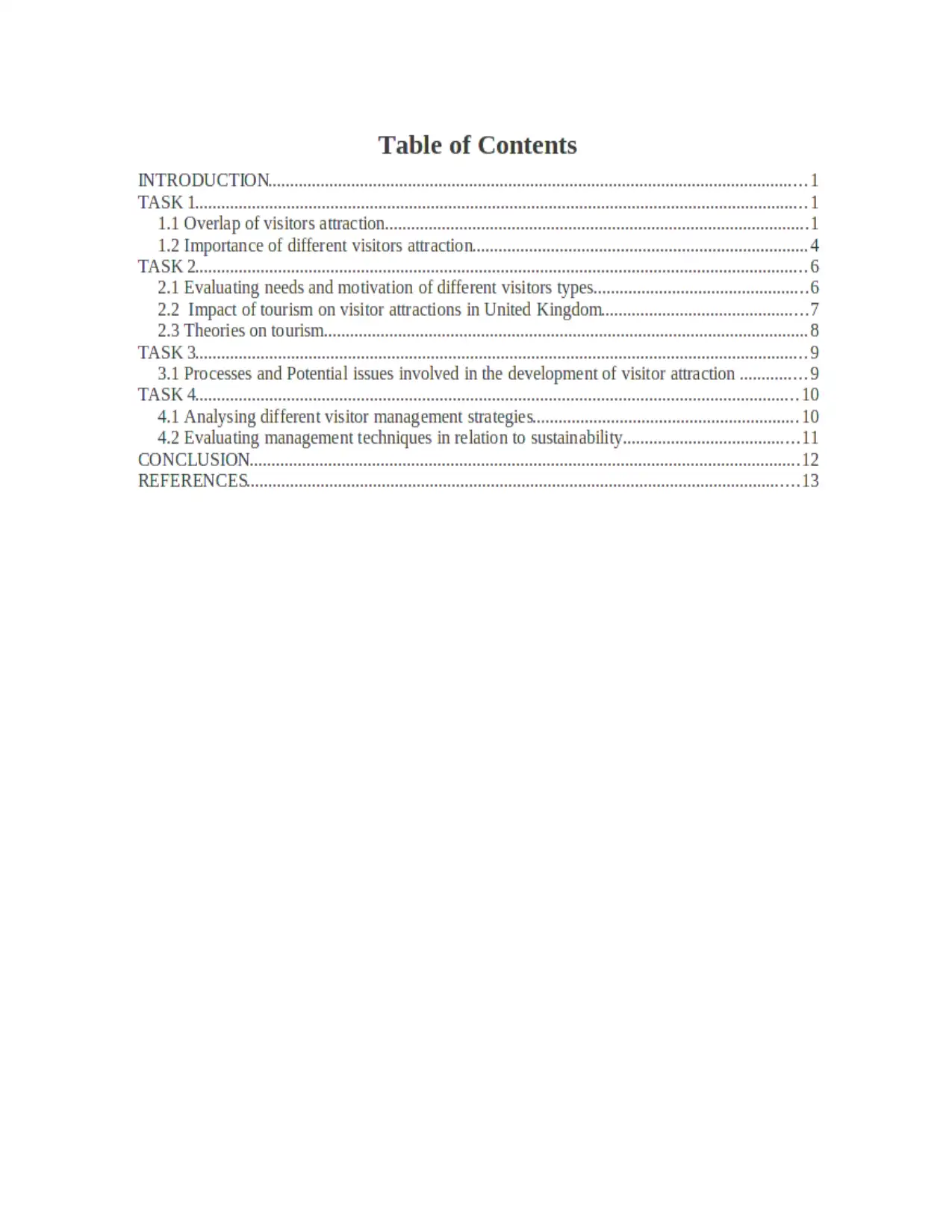
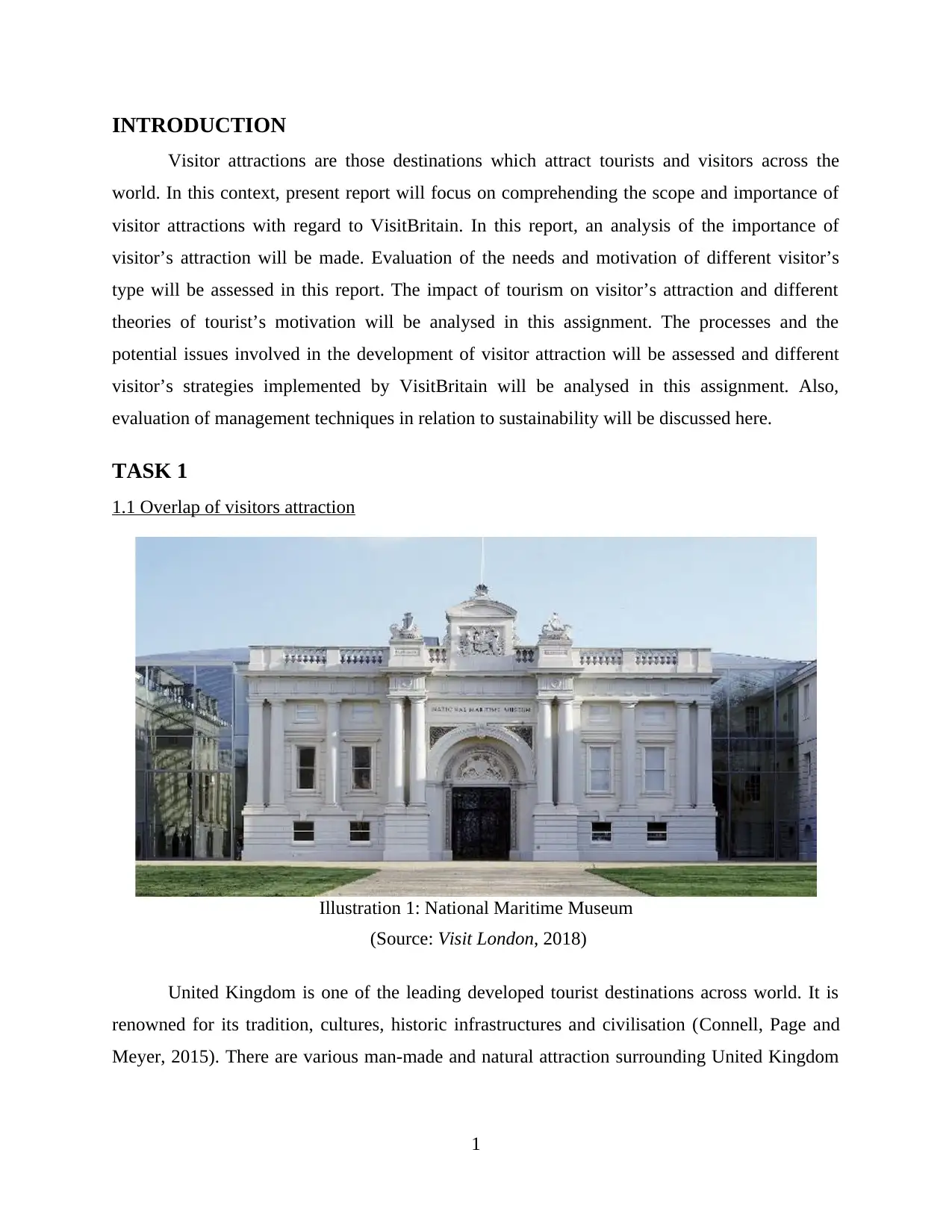
INTRODUCTION
Visitor attractions are those destinations which attract tourists and visitors across the
world. In this context, present report will focus on comprehending the scope and importance of
visitor attractions with regard to VisitBritain. In this report, an analysis of the importance of
visitor’s attraction will be made. Evaluation of the needs and motivation of different visitor’s
type will be assessed in this report. The impact of tourism on visitor’s attraction and different
theories of tourist’s motivation will be analysed in this assignment. The processes and the
potential issues involved in the development of visitor attraction will be assessed and different
visitor’s strategies implemented by VisitBritain will be analysed in this assignment. Also,
evaluation of management techniques in relation to sustainability will be discussed here.
TASK 1
1.1 Overlap of visitors attraction
United Kingdom is one of the leading developed tourist destinations across world. It is
renowned for its tradition, cultures, historic infrastructures and civilisation (Connell, Page and
Meyer, 2015). There are various man-made and natural attraction surrounding United Kingdom
1
Illustration 1: National Maritime Museum
(Source: Visit London, 2018)
Visitor attractions are those destinations which attract tourists and visitors across the
world. In this context, present report will focus on comprehending the scope and importance of
visitor attractions with regard to VisitBritain. In this report, an analysis of the importance of
visitor’s attraction will be made. Evaluation of the needs and motivation of different visitor’s
type will be assessed in this report. The impact of tourism on visitor’s attraction and different
theories of tourist’s motivation will be analysed in this assignment. The processes and the
potential issues involved in the development of visitor attraction will be assessed and different
visitor’s strategies implemented by VisitBritain will be analysed in this assignment. Also,
evaluation of management techniques in relation to sustainability will be discussed here.
TASK 1
1.1 Overlap of visitors attraction
United Kingdom is one of the leading developed tourist destinations across world. It is
renowned for its tradition, cultures, historic infrastructures and civilisation (Connell, Page and
Meyer, 2015). There are various man-made and natural attraction surrounding United Kingdom
1
Illustration 1: National Maritime Museum
(Source: Visit London, 2018)
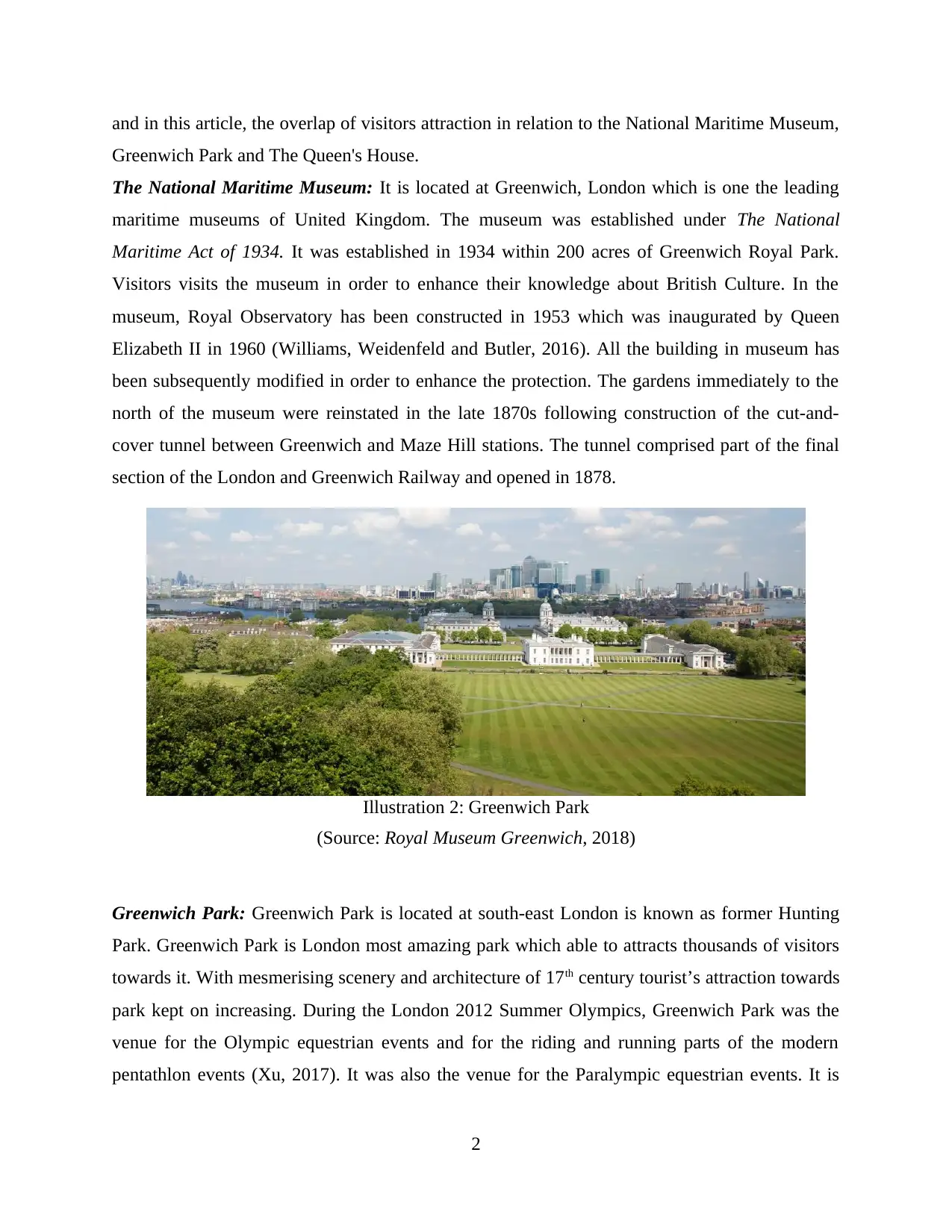
and in this article, the overlap of visitors attraction in relation to the National Maritime Museum,
Greenwich Park and The Queen's House.
The National Maritime Museum: It is located at Greenwich, London which is one the leading
maritime museums of United Kingdom. The museum was established under The National
Maritime Act of 1934. It was established in 1934 within 200 acres of Greenwich Royal Park.
Visitors visits the museum in order to enhance their knowledge about British Culture. In the
museum, Royal Observatory has been constructed in 1953 which was inaugurated by Queen
Elizabeth II in 1960 (Williams, Weidenfeld and Butler, 2016). All the building in museum has
been subsequently modified in order to enhance the protection. The gardens immediately to the
north of the museum were reinstated in the late 1870s following construction of the cut-and-
cover tunnel between Greenwich and Maze Hill stations. The tunnel comprised part of the final
section of the London and Greenwich Railway and opened in 1878.
Greenwich Park: Greenwich Park is located at south-east London is known as former Hunting
Park. Greenwich Park is London most amazing park which able to attracts thousands of visitors
towards it. With mesmerising scenery and architecture of 17th century tourist’s attraction towards
park kept on increasing. During the London 2012 Summer Olympics, Greenwich Park was the
venue for the Olympic equestrian events and for the riding and running parts of the modern
pentathlon events (Xu, 2017). It was also the venue for the Paralympic equestrian events. It is
2
Illustration 2: Greenwich Park
(Source: Royal Museum Greenwich, 2018)
Greenwich Park and The Queen's House.
The National Maritime Museum: It is located at Greenwich, London which is one the leading
maritime museums of United Kingdom. The museum was established under The National
Maritime Act of 1934. It was established in 1934 within 200 acres of Greenwich Royal Park.
Visitors visits the museum in order to enhance their knowledge about British Culture. In the
museum, Royal Observatory has been constructed in 1953 which was inaugurated by Queen
Elizabeth II in 1960 (Williams, Weidenfeld and Butler, 2016). All the building in museum has
been subsequently modified in order to enhance the protection. The gardens immediately to the
north of the museum were reinstated in the late 1870s following construction of the cut-and-
cover tunnel between Greenwich and Maze Hill stations. The tunnel comprised part of the final
section of the London and Greenwich Railway and opened in 1878.
Greenwich Park: Greenwich Park is located at south-east London is known as former Hunting
Park. Greenwich Park is London most amazing park which able to attracts thousands of visitors
towards it. With mesmerising scenery and architecture of 17th century tourist’s attraction towards
park kept on increasing. During the London 2012 Summer Olympics, Greenwich Park was the
venue for the Olympic equestrian events and for the riding and running parts of the modern
pentathlon events (Xu, 2017). It was also the venue for the Paralympic equestrian events. It is
2
Illustration 2: Greenwich Park
(Source: Royal Museum Greenwich, 2018)
Secure Best Marks with AI Grader
Need help grading? Try our AI Grader for instant feedback on your assignments.
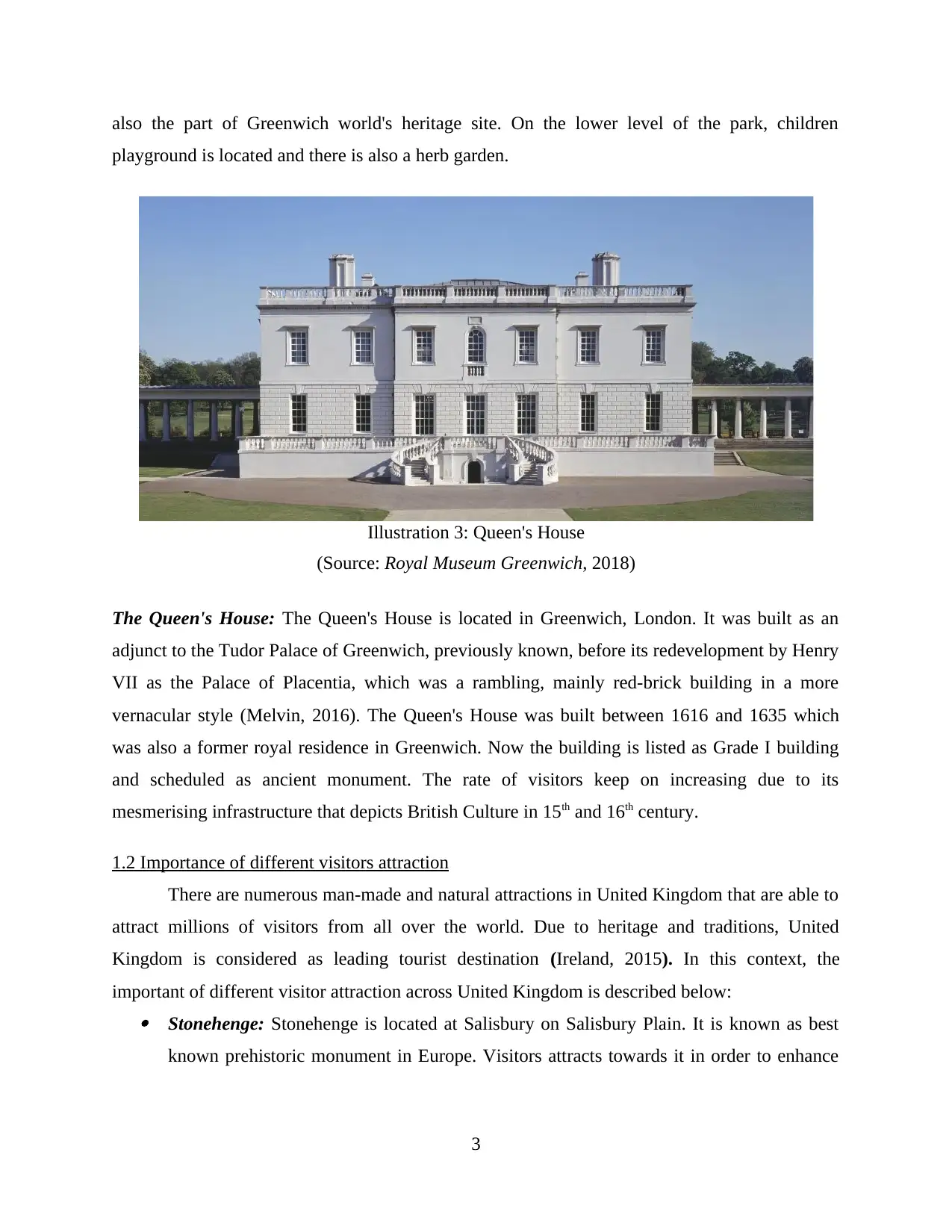
also the part of Greenwich world's heritage site. On the lower level of the park, children
playground is located and there is also a herb garden.
The Queen's House: The Queen's House is located in Greenwich, London. It was built as an
adjunct to the Tudor Palace of Greenwich, previously known, before its redevelopment by Henry
VII as the Palace of Placentia, which was a rambling, mainly red-brick building in a more
vernacular style (Melvin, 2016). The Queen's House was built between 1616 and 1635 which
was also a former royal residence in Greenwich. Now the building is listed as Grade I building
and scheduled as ancient monument. The rate of visitors keep on increasing due to its
mesmerising infrastructure that depicts British Culture in 15th and 16th century.
1.2 Importance of different visitors attraction
There are numerous man-made and natural attractions in United Kingdom that are able to
attract millions of visitors from all over the world. Due to heritage and traditions, United
Kingdom is considered as leading tourist destination (Ireland, 2015). In this context, the
important of different visitor attraction across United Kingdom is described below: Stonehenge: Stonehenge is located at Salisbury on Salisbury Plain. It is known as best
known prehistoric monument in Europe. Visitors attracts towards it in order to enhance
3
Illustration 3: Queen's House
(Source: Royal Museum Greenwich, 2018)
playground is located and there is also a herb garden.
The Queen's House: The Queen's House is located in Greenwich, London. It was built as an
adjunct to the Tudor Palace of Greenwich, previously known, before its redevelopment by Henry
VII as the Palace of Placentia, which was a rambling, mainly red-brick building in a more
vernacular style (Melvin, 2016). The Queen's House was built between 1616 and 1635 which
was also a former royal residence in Greenwich. Now the building is listed as Grade I building
and scheduled as ancient monument. The rate of visitors keep on increasing due to its
mesmerising infrastructure that depicts British Culture in 15th and 16th century.
1.2 Importance of different visitors attraction
There are numerous man-made and natural attractions in United Kingdom that are able to
attract millions of visitors from all over the world. Due to heritage and traditions, United
Kingdom is considered as leading tourist destination (Ireland, 2015). In this context, the
important of different visitor attraction across United Kingdom is described below: Stonehenge: Stonehenge is located at Salisbury on Salisbury Plain. It is known as best
known prehistoric monument in Europe. Visitors attracts towards it in order to enhance
3
Illustration 3: Queen's House
(Source: Royal Museum Greenwich, 2018)
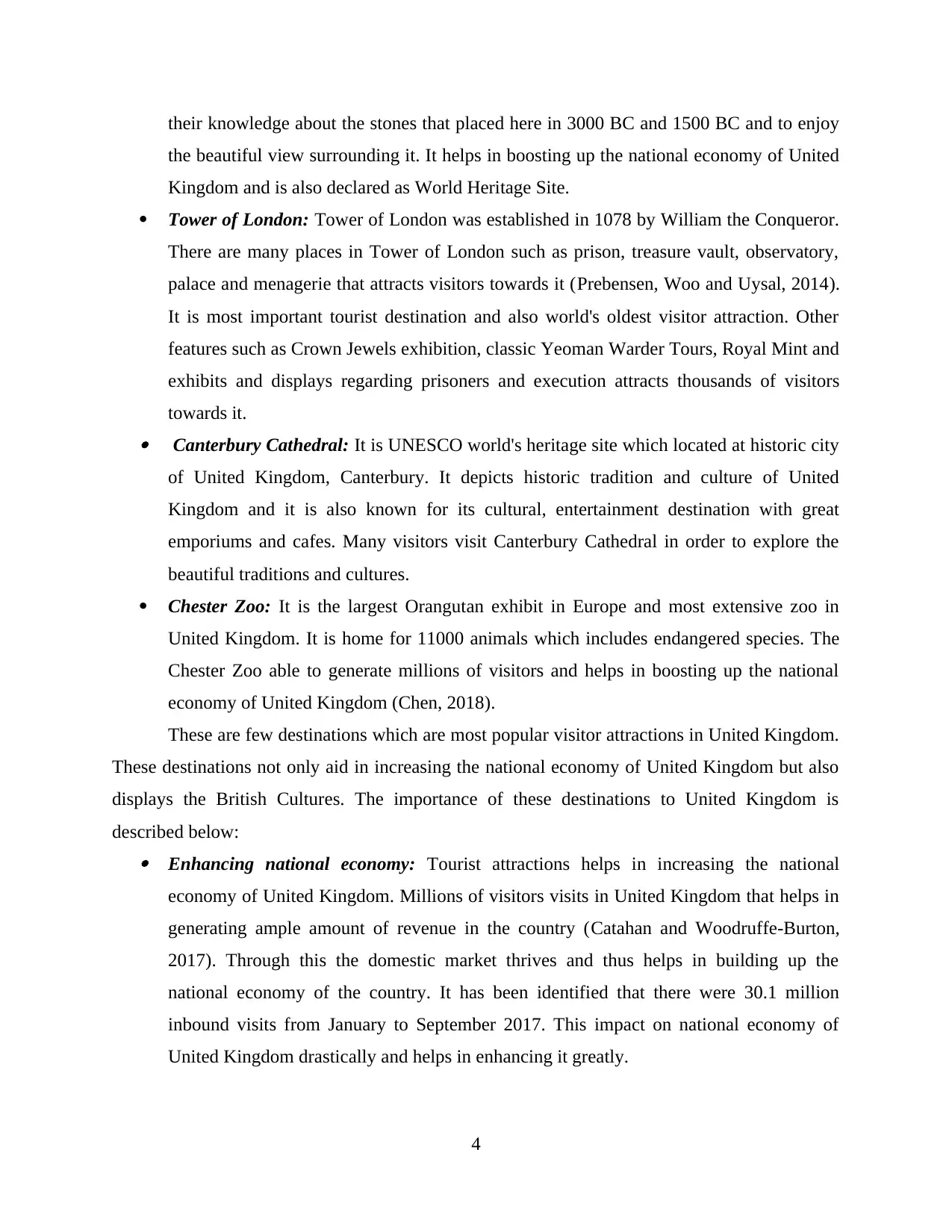
their knowledge about the stones that placed here in 3000 BC and 1500 BC and to enjoy
the beautiful view surrounding it. It helps in boosting up the national economy of United
Kingdom and is also declared as World Heritage Site.
Tower of London: Tower of London was established in 1078 by William the Conqueror.
There are many places in Tower of London such as prison, treasure vault, observatory,
palace and menagerie that attracts visitors towards it (Prebensen, Woo and Uysal, 2014).
It is most important tourist destination and also world's oldest visitor attraction. Other
features such as Crown Jewels exhibition, classic Yeoman Warder Tours, Royal Mint and
exhibits and displays regarding prisoners and execution attracts thousands of visitors
towards it. Canterbury Cathedral: It is UNESCO world's heritage site which located at historic city
of United Kingdom, Canterbury. It depicts historic tradition and culture of United
Kingdom and it is also known for its cultural, entertainment destination with great
emporiums and cafes. Many visitors visit Canterbury Cathedral in order to explore the
beautiful traditions and cultures.
Chester Zoo: It is the largest Orangutan exhibit in Europe and most extensive zoo in
United Kingdom. It is home for 11000 animals which includes endangered species. The
Chester Zoo able to generate millions of visitors and helps in boosting up the national
economy of United Kingdom (Chen, 2018).
These are few destinations which are most popular visitor attractions in United Kingdom.
These destinations not only aid in increasing the national economy of United Kingdom but also
displays the British Cultures. The importance of these destinations to United Kingdom is
described below: Enhancing national economy: Tourist attractions helps in increasing the national
economy of United Kingdom. Millions of visitors visits in United Kingdom that helps in
generating ample amount of revenue in the country (Catahan and Woodruffe-Burton,
2017). Through this the domestic market thrives and thus helps in building up the
national economy of the country. It has been identified that there were 30.1 million
inbound visits from January to September 2017. This impact on national economy of
United Kingdom drastically and helps in enhancing it greatly.
4
the beautiful view surrounding it. It helps in boosting up the national economy of United
Kingdom and is also declared as World Heritage Site.
Tower of London: Tower of London was established in 1078 by William the Conqueror.
There are many places in Tower of London such as prison, treasure vault, observatory,
palace and menagerie that attracts visitors towards it (Prebensen, Woo and Uysal, 2014).
It is most important tourist destination and also world's oldest visitor attraction. Other
features such as Crown Jewels exhibition, classic Yeoman Warder Tours, Royal Mint and
exhibits and displays regarding prisoners and execution attracts thousands of visitors
towards it. Canterbury Cathedral: It is UNESCO world's heritage site which located at historic city
of United Kingdom, Canterbury. It depicts historic tradition and culture of United
Kingdom and it is also known for its cultural, entertainment destination with great
emporiums and cafes. Many visitors visit Canterbury Cathedral in order to explore the
beautiful traditions and cultures.
Chester Zoo: It is the largest Orangutan exhibit in Europe and most extensive zoo in
United Kingdom. It is home for 11000 animals which includes endangered species. The
Chester Zoo able to generate millions of visitors and helps in boosting up the national
economy of United Kingdom (Chen, 2018).
These are few destinations which are most popular visitor attractions in United Kingdom.
These destinations not only aid in increasing the national economy of United Kingdom but also
displays the British Cultures. The importance of these destinations to United Kingdom is
described below: Enhancing national economy: Tourist attractions helps in increasing the national
economy of United Kingdom. Millions of visitors visits in United Kingdom that helps in
generating ample amount of revenue in the country (Catahan and Woodruffe-Burton,
2017). Through this the domestic market thrives and thus helps in building up the
national economy of the country. It has been identified that there were 30.1 million
inbound visits from January to September 2017. This impact on national economy of
United Kingdom drastically and helps in enhancing it greatly.
4
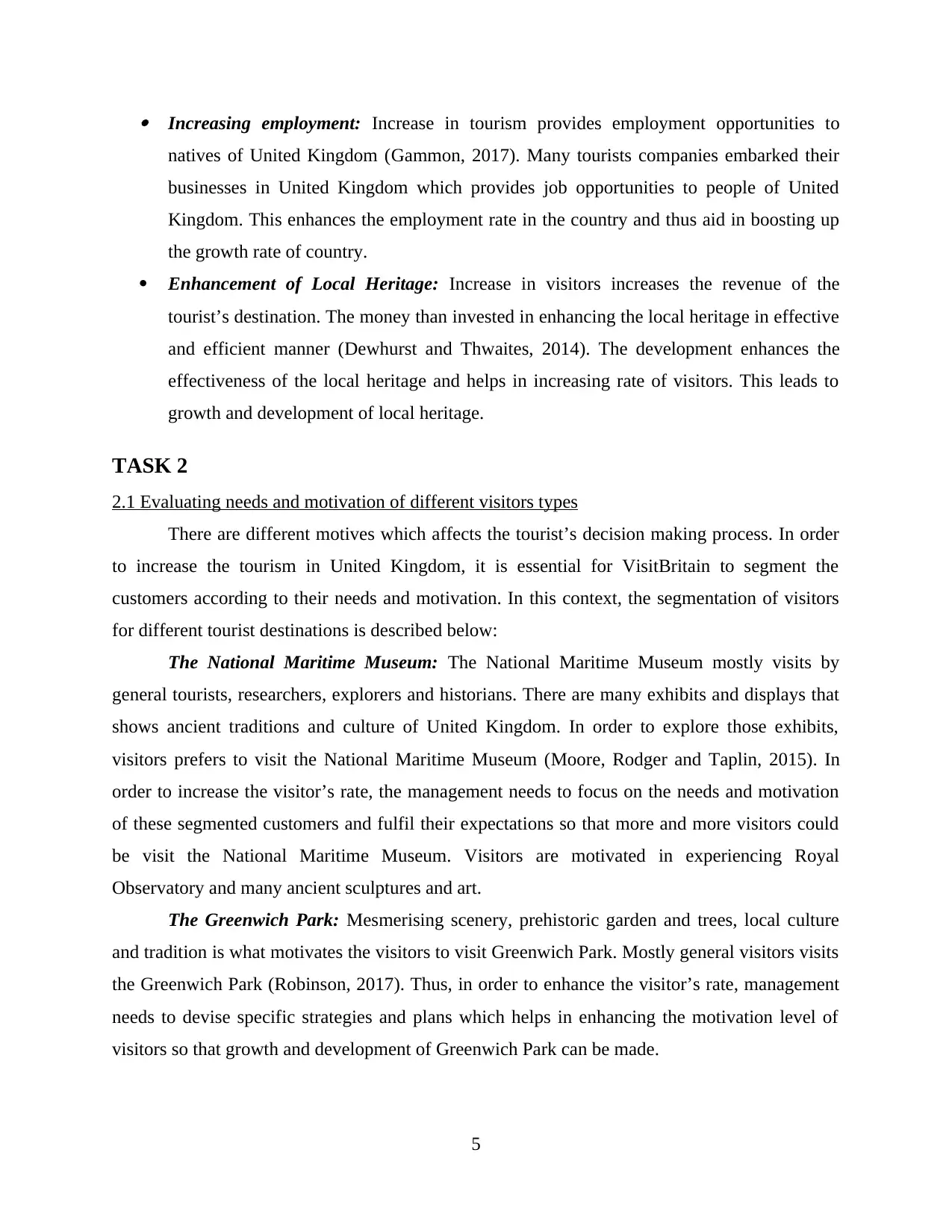
Increasing employment: Increase in tourism provides employment opportunities to
natives of United Kingdom (Gammon, 2017). Many tourists companies embarked their
businesses in United Kingdom which provides job opportunities to people of United
Kingdom. This enhances the employment rate in the country and thus aid in boosting up
the growth rate of country.
Enhancement of Local Heritage: Increase in visitors increases the revenue of the
tourist’s destination. The money than invested in enhancing the local heritage in effective
and efficient manner (Dewhurst and Thwaites, 2014). The development enhances the
effectiveness of the local heritage and helps in increasing rate of visitors. This leads to
growth and development of local heritage.
TASK 2
2.1 Evaluating needs and motivation of different visitors types
There are different motives which affects the tourist’s decision making process. In order
to increase the tourism in United Kingdom, it is essential for VisitBritain to segment the
customers according to their needs and motivation. In this context, the segmentation of visitors
for different tourist destinations is described below:
The National Maritime Museum: The National Maritime Museum mostly visits by
general tourists, researchers, explorers and historians. There are many exhibits and displays that
shows ancient traditions and culture of United Kingdom. In order to explore those exhibits,
visitors prefers to visit the National Maritime Museum (Moore, Rodger and Taplin, 2015). In
order to increase the visitor’s rate, the management needs to focus on the needs and motivation
of these segmented customers and fulfil their expectations so that more and more visitors could
be visit the National Maritime Museum. Visitors are motivated in experiencing Royal
Observatory and many ancient sculptures and art.
The Greenwich Park: Mesmerising scenery, prehistoric garden and trees, local culture
and tradition is what motivates the visitors to visit Greenwich Park. Mostly general visitors visits
the Greenwich Park (Robinson, 2017). Thus, in order to enhance the visitor’s rate, management
needs to devise specific strategies and plans which helps in enhancing the motivation level of
visitors so that growth and development of Greenwich Park can be made.
5
natives of United Kingdom (Gammon, 2017). Many tourists companies embarked their
businesses in United Kingdom which provides job opportunities to people of United
Kingdom. This enhances the employment rate in the country and thus aid in boosting up
the growth rate of country.
Enhancement of Local Heritage: Increase in visitors increases the revenue of the
tourist’s destination. The money than invested in enhancing the local heritage in effective
and efficient manner (Dewhurst and Thwaites, 2014). The development enhances the
effectiveness of the local heritage and helps in increasing rate of visitors. This leads to
growth and development of local heritage.
TASK 2
2.1 Evaluating needs and motivation of different visitors types
There are different motives which affects the tourist’s decision making process. In order
to increase the tourism in United Kingdom, it is essential for VisitBritain to segment the
customers according to their needs and motivation. In this context, the segmentation of visitors
for different tourist destinations is described below:
The National Maritime Museum: The National Maritime Museum mostly visits by
general tourists, researchers, explorers and historians. There are many exhibits and displays that
shows ancient traditions and culture of United Kingdom. In order to explore those exhibits,
visitors prefers to visit the National Maritime Museum (Moore, Rodger and Taplin, 2015). In
order to increase the visitor’s rate, the management needs to focus on the needs and motivation
of these segmented customers and fulfil their expectations so that more and more visitors could
be visit the National Maritime Museum. Visitors are motivated in experiencing Royal
Observatory and many ancient sculptures and art.
The Greenwich Park: Mesmerising scenery, prehistoric garden and trees, local culture
and tradition is what motivates the visitors to visit Greenwich Park. Mostly general visitors visits
the Greenwich Park (Robinson, 2017). Thus, in order to enhance the visitor’s rate, management
needs to devise specific strategies and plans which helps in enhancing the motivation level of
visitors so that growth and development of Greenwich Park can be made.
5
Paraphrase This Document
Need a fresh take? Get an instant paraphrase of this document with our AI Paraphraser
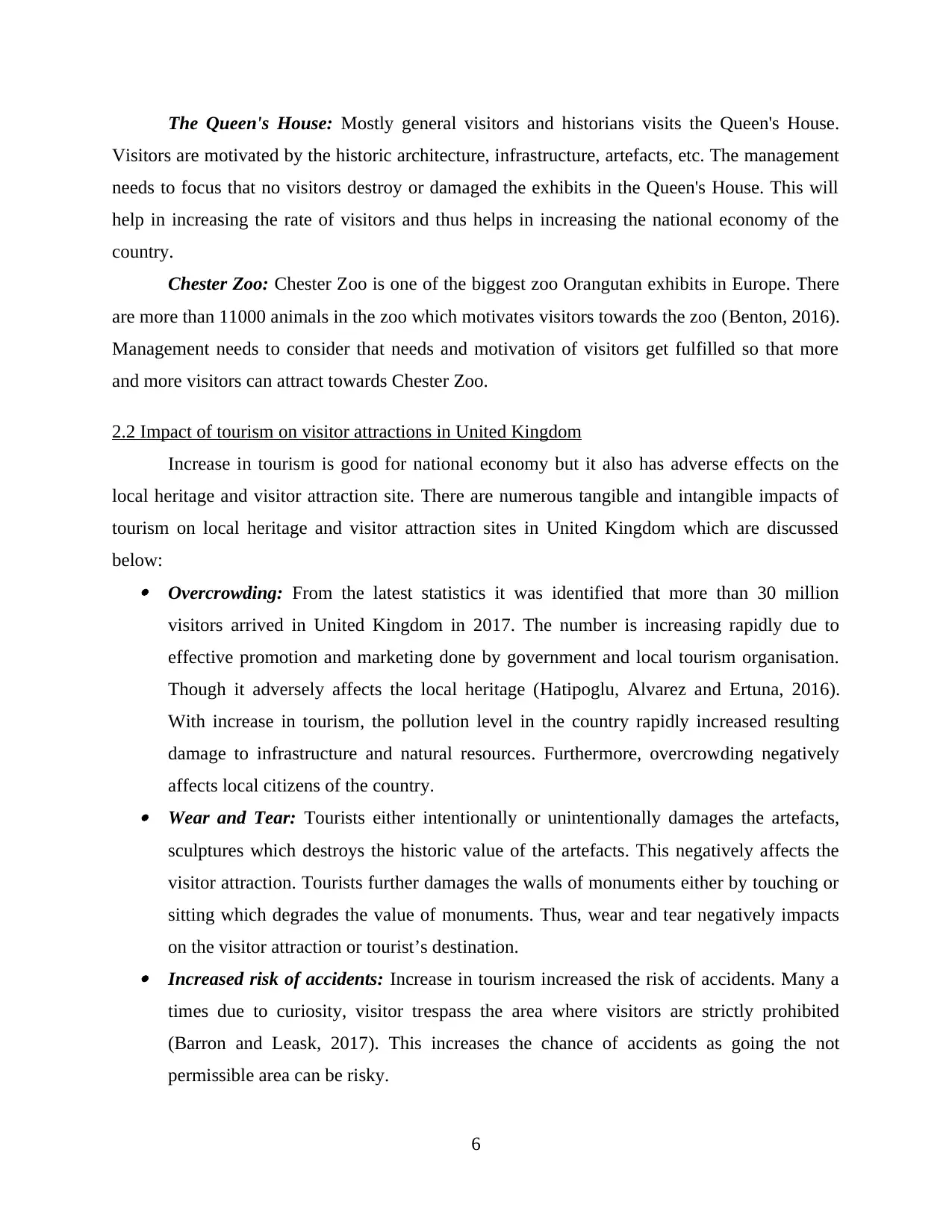
The Queen's House: Mostly general visitors and historians visits the Queen's House.
Visitors are motivated by the historic architecture, infrastructure, artefacts, etc. The management
needs to focus that no visitors destroy or damaged the exhibits in the Queen's House. This will
help in increasing the rate of visitors and thus helps in increasing the national economy of the
country.
Chester Zoo: Chester Zoo is one of the biggest zoo Orangutan exhibits in Europe. There
are more than 11000 animals in the zoo which motivates visitors towards the zoo (Benton, 2016).
Management needs to consider that needs and motivation of visitors get fulfilled so that more
and more visitors can attract towards Chester Zoo.
2.2 Impact of tourism on visitor attractions in United Kingdom
Increase in tourism is good for national economy but it also has adverse effects on the
local heritage and visitor attraction site. There are numerous tangible and intangible impacts of
tourism on local heritage and visitor attraction sites in United Kingdom which are discussed
below: Overcrowding: From the latest statistics it was identified that more than 30 million
visitors arrived in United Kingdom in 2017. The number is increasing rapidly due to
effective promotion and marketing done by government and local tourism organisation.
Though it adversely affects the local heritage (Hatipoglu, Alvarez and Ertuna, 2016).
With increase in tourism, the pollution level in the country rapidly increased resulting
damage to infrastructure and natural resources. Furthermore, overcrowding negatively
affects local citizens of the country. Wear and Tear: Tourists either intentionally or unintentionally damages the artefacts,
sculptures which destroys the historic value of the artefacts. This negatively affects the
visitor attraction. Tourists further damages the walls of monuments either by touching or
sitting which degrades the value of monuments. Thus, wear and tear negatively impacts
on the visitor attraction or tourist’s destination. Increased risk of accidents: Increase in tourism increased the risk of accidents. Many a
times due to curiosity, visitor trespass the area where visitors are strictly prohibited
(Barron and Leask, 2017). This increases the chance of accidents as going the not
permissible area can be risky.
6
Visitors are motivated by the historic architecture, infrastructure, artefacts, etc. The management
needs to focus that no visitors destroy or damaged the exhibits in the Queen's House. This will
help in increasing the rate of visitors and thus helps in increasing the national economy of the
country.
Chester Zoo: Chester Zoo is one of the biggest zoo Orangutan exhibits in Europe. There
are more than 11000 animals in the zoo which motivates visitors towards the zoo (Benton, 2016).
Management needs to consider that needs and motivation of visitors get fulfilled so that more
and more visitors can attract towards Chester Zoo.
2.2 Impact of tourism on visitor attractions in United Kingdom
Increase in tourism is good for national economy but it also has adverse effects on the
local heritage and visitor attraction site. There are numerous tangible and intangible impacts of
tourism on local heritage and visitor attraction sites in United Kingdom which are discussed
below: Overcrowding: From the latest statistics it was identified that more than 30 million
visitors arrived in United Kingdom in 2017. The number is increasing rapidly due to
effective promotion and marketing done by government and local tourism organisation.
Though it adversely affects the local heritage (Hatipoglu, Alvarez and Ertuna, 2016).
With increase in tourism, the pollution level in the country rapidly increased resulting
damage to infrastructure and natural resources. Furthermore, overcrowding negatively
affects local citizens of the country. Wear and Tear: Tourists either intentionally or unintentionally damages the artefacts,
sculptures which destroys the historic value of the artefacts. This negatively affects the
visitor attraction. Tourists further damages the walls of monuments either by touching or
sitting which degrades the value of monuments. Thus, wear and tear negatively impacts
on the visitor attraction or tourist’s destination. Increased risk of accidents: Increase in tourism increased the risk of accidents. Many a
times due to curiosity, visitor trespass the area where visitors are strictly prohibited
(Barron and Leask, 2017). This increases the chance of accidents as going the not
permissible area can be risky.
6
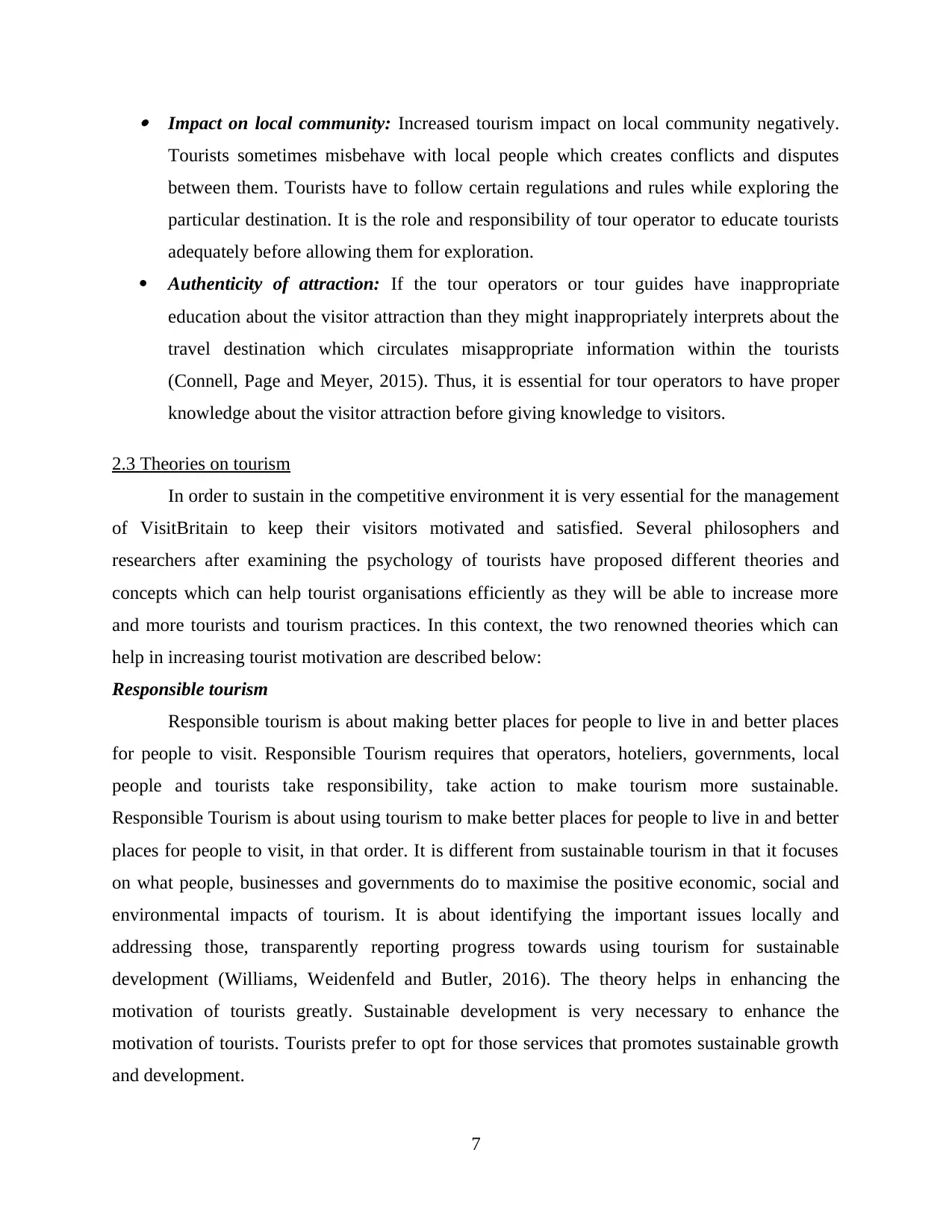
Impact on local community: Increased tourism impact on local community negatively.
Tourists sometimes misbehave with local people which creates conflicts and disputes
between them. Tourists have to follow certain regulations and rules while exploring the
particular destination. It is the role and responsibility of tour operator to educate tourists
adequately before allowing them for exploration.
Authenticity of attraction: If the tour operators or tour guides have inappropriate
education about the visitor attraction than they might inappropriately interprets about the
travel destination which circulates misappropriate information within the tourists
(Connell, Page and Meyer, 2015). Thus, it is essential for tour operators to have proper
knowledge about the visitor attraction before giving knowledge to visitors.
2.3 Theories on tourism
In order to sustain in the competitive environment it is very essential for the management
of VisitBritain to keep their visitors motivated and satisfied. Several philosophers and
researchers after examining the psychology of tourists have proposed different theories and
concepts which can help tourist organisations efficiently as they will be able to increase more
and more tourists and tourism practices. In this context, the two renowned theories which can
help in increasing tourist motivation are described below:
Responsible tourism
Responsible tourism is about making better places for people to live in and better places
for people to visit. Responsible Tourism requires that operators, hoteliers, governments, local
people and tourists take responsibility, take action to make tourism more sustainable.
Responsible Tourism is about using tourism to make better places for people to live in and better
places for people to visit, in that order. It is different from sustainable tourism in that it focuses
on what people, businesses and governments do to maximise the positive economic, social and
environmental impacts of tourism. It is about identifying the important issues locally and
addressing those, transparently reporting progress towards using tourism for sustainable
development (Williams, Weidenfeld and Butler, 2016). The theory helps in enhancing the
motivation of tourists greatly. Sustainable development is very necessary to enhance the
motivation of tourists. Tourists prefer to opt for those services that promotes sustainable growth
and development.
7
Tourists sometimes misbehave with local people which creates conflicts and disputes
between them. Tourists have to follow certain regulations and rules while exploring the
particular destination. It is the role and responsibility of tour operator to educate tourists
adequately before allowing them for exploration.
Authenticity of attraction: If the tour operators or tour guides have inappropriate
education about the visitor attraction than they might inappropriately interprets about the
travel destination which circulates misappropriate information within the tourists
(Connell, Page and Meyer, 2015). Thus, it is essential for tour operators to have proper
knowledge about the visitor attraction before giving knowledge to visitors.
2.3 Theories on tourism
In order to sustain in the competitive environment it is very essential for the management
of VisitBritain to keep their visitors motivated and satisfied. Several philosophers and
researchers after examining the psychology of tourists have proposed different theories and
concepts which can help tourist organisations efficiently as they will be able to increase more
and more tourists and tourism practices. In this context, the two renowned theories which can
help in increasing tourist motivation are described below:
Responsible tourism
Responsible tourism is about making better places for people to live in and better places
for people to visit. Responsible Tourism requires that operators, hoteliers, governments, local
people and tourists take responsibility, take action to make tourism more sustainable.
Responsible Tourism is about using tourism to make better places for people to live in and better
places for people to visit, in that order. It is different from sustainable tourism in that it focuses
on what people, businesses and governments do to maximise the positive economic, social and
environmental impacts of tourism. It is about identifying the important issues locally and
addressing those, transparently reporting progress towards using tourism for sustainable
development (Williams, Weidenfeld and Butler, 2016). The theory helps in enhancing the
motivation of tourists greatly. Sustainable development is very necessary to enhance the
motivation of tourists. Tourists prefer to opt for those services that promotes sustainable growth
and development.
7
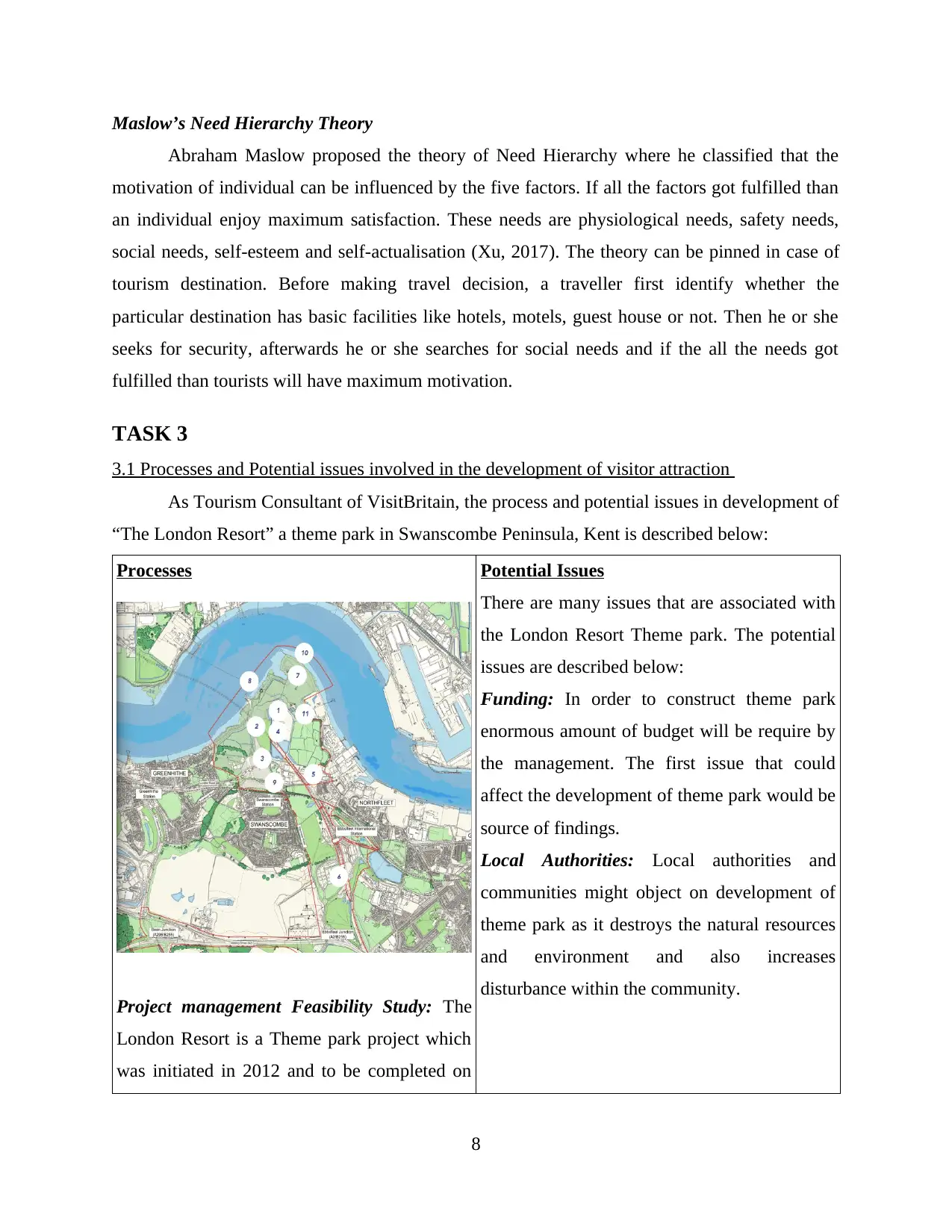
Maslow’s Need Hierarchy Theory
Abraham Maslow proposed the theory of Need Hierarchy where he classified that the
motivation of individual can be influenced by the five factors. If all the factors got fulfilled than
an individual enjoy maximum satisfaction. These needs are physiological needs, safety needs,
social needs, self-esteem and self-actualisation (Xu, 2017). The theory can be pinned in case of
tourism destination. Before making travel decision, a traveller first identify whether the
particular destination has basic facilities like hotels, motels, guest house or not. Then he or she
seeks for security, afterwards he or she searches for social needs and if the all the needs got
fulfilled than tourists will have maximum motivation.
TASK 3
3.1 Processes and Potential issues involved in the development of visitor attraction
As Tourism Consultant of VisitBritain, the process and potential issues in development of
“The London Resort” a theme park in Swanscombe Peninsula, Kent is described below:
Processes
Project management Feasibility Study: The
London Resort is a Theme park project which
was initiated in 2012 and to be completed on
Potential Issues
There are many issues that are associated with
the London Resort Theme park. The potential
issues are described below:
Funding: In order to construct theme park
enormous amount of budget will be require by
the management. The first issue that could
affect the development of theme park would be
source of findings.
Local Authorities: Local authorities and
communities might object on development of
theme park as it destroys the natural resources
and environment and also increases
disturbance within the community.
8
Abraham Maslow proposed the theory of Need Hierarchy where he classified that the
motivation of individual can be influenced by the five factors. If all the factors got fulfilled than
an individual enjoy maximum satisfaction. These needs are physiological needs, safety needs,
social needs, self-esteem and self-actualisation (Xu, 2017). The theory can be pinned in case of
tourism destination. Before making travel decision, a traveller first identify whether the
particular destination has basic facilities like hotels, motels, guest house or not. Then he or she
seeks for security, afterwards he or she searches for social needs and if the all the needs got
fulfilled than tourists will have maximum motivation.
TASK 3
3.1 Processes and Potential issues involved in the development of visitor attraction
As Tourism Consultant of VisitBritain, the process and potential issues in development of
“The London Resort” a theme park in Swanscombe Peninsula, Kent is described below:
Processes
Project management Feasibility Study: The
London Resort is a Theme park project which
was initiated in 2012 and to be completed on
Potential Issues
There are many issues that are associated with
the London Resort Theme park. The potential
issues are described below:
Funding: In order to construct theme park
enormous amount of budget will be require by
the management. The first issue that could
affect the development of theme park would be
source of findings.
Local Authorities: Local authorities and
communities might object on development of
theme park as it destroys the natural resources
and environment and also increases
disturbance within the community.
8
Secure Best Marks with AI Grader
Need help grading? Try our AI Grader for instant feedback on your assignments.
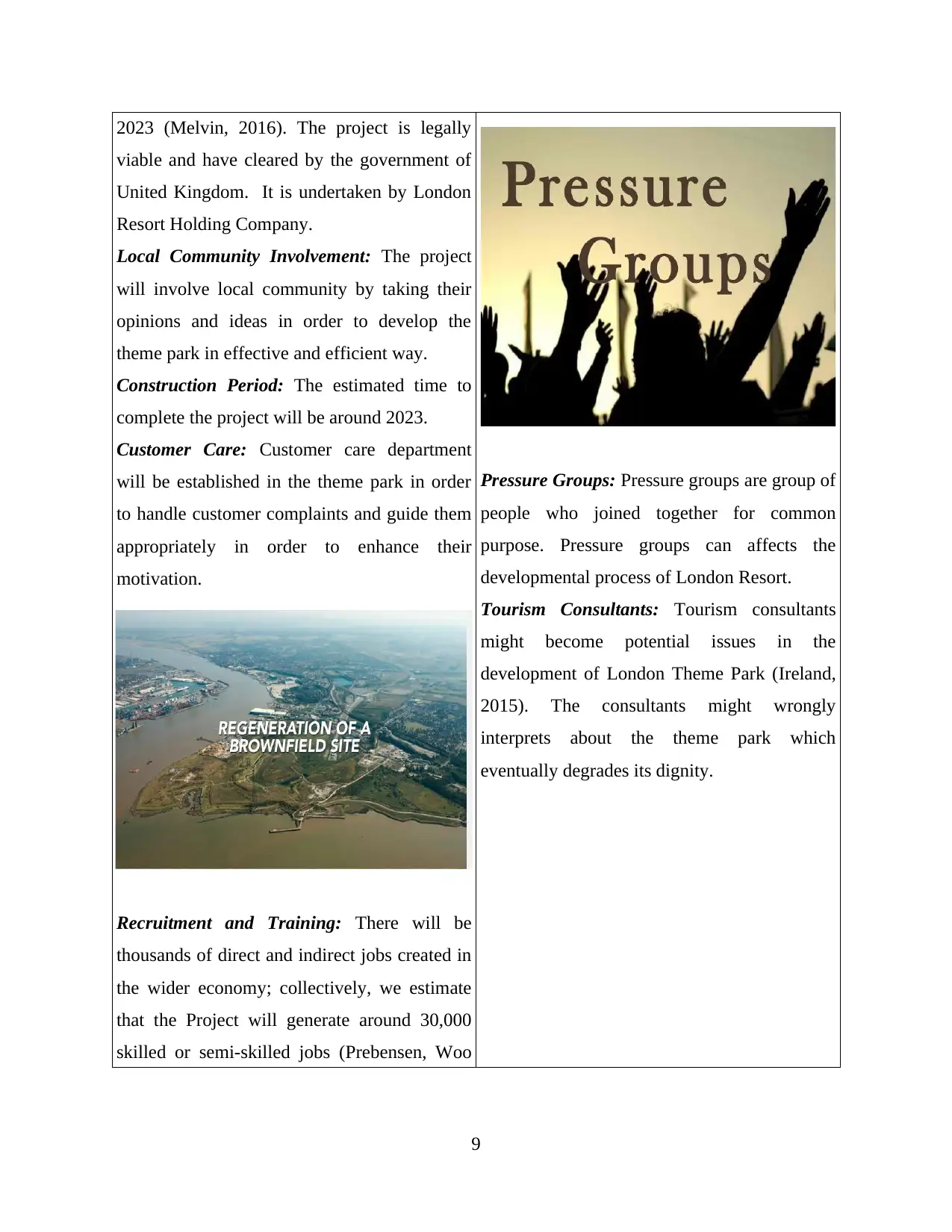
2023 (Melvin, 2016). The project is legally
viable and have cleared by the government of
United Kingdom. It is undertaken by London
Resort Holding Company.
Local Community Involvement: The project
will involve local community by taking their
opinions and ideas in order to develop the
theme park in effective and efficient way.
Construction Period: The estimated time to
complete the project will be around 2023.
Customer Care: Customer care department
will be established in the theme park in order
to handle customer complaints and guide them
appropriately in order to enhance their
motivation.
Recruitment and Training: There will be
thousands of direct and indirect jobs created in
the wider economy; collectively, we estimate
that the Project will generate around 30,000
skilled or semi-skilled jobs (Prebensen, Woo
Pressure Groups: Pressure groups are group of
people who joined together for common
purpose. Pressure groups can affects the
developmental process of London Resort.
Tourism Consultants: Tourism consultants
might become potential issues in the
development of London Theme Park (Ireland,
2015). The consultants might wrongly
interprets about the theme park which
eventually degrades its dignity.
9
viable and have cleared by the government of
United Kingdom. It is undertaken by London
Resort Holding Company.
Local Community Involvement: The project
will involve local community by taking their
opinions and ideas in order to develop the
theme park in effective and efficient way.
Construction Period: The estimated time to
complete the project will be around 2023.
Customer Care: Customer care department
will be established in the theme park in order
to handle customer complaints and guide them
appropriately in order to enhance their
motivation.
Recruitment and Training: There will be
thousands of direct and indirect jobs created in
the wider economy; collectively, we estimate
that the Project will generate around 30,000
skilled or semi-skilled jobs (Prebensen, Woo
Pressure Groups: Pressure groups are group of
people who joined together for common
purpose. Pressure groups can affects the
developmental process of London Resort.
Tourism Consultants: Tourism consultants
might become potential issues in the
development of London Theme Park (Ireland,
2015). The consultants might wrongly
interprets about the theme park which
eventually degrades its dignity.
9
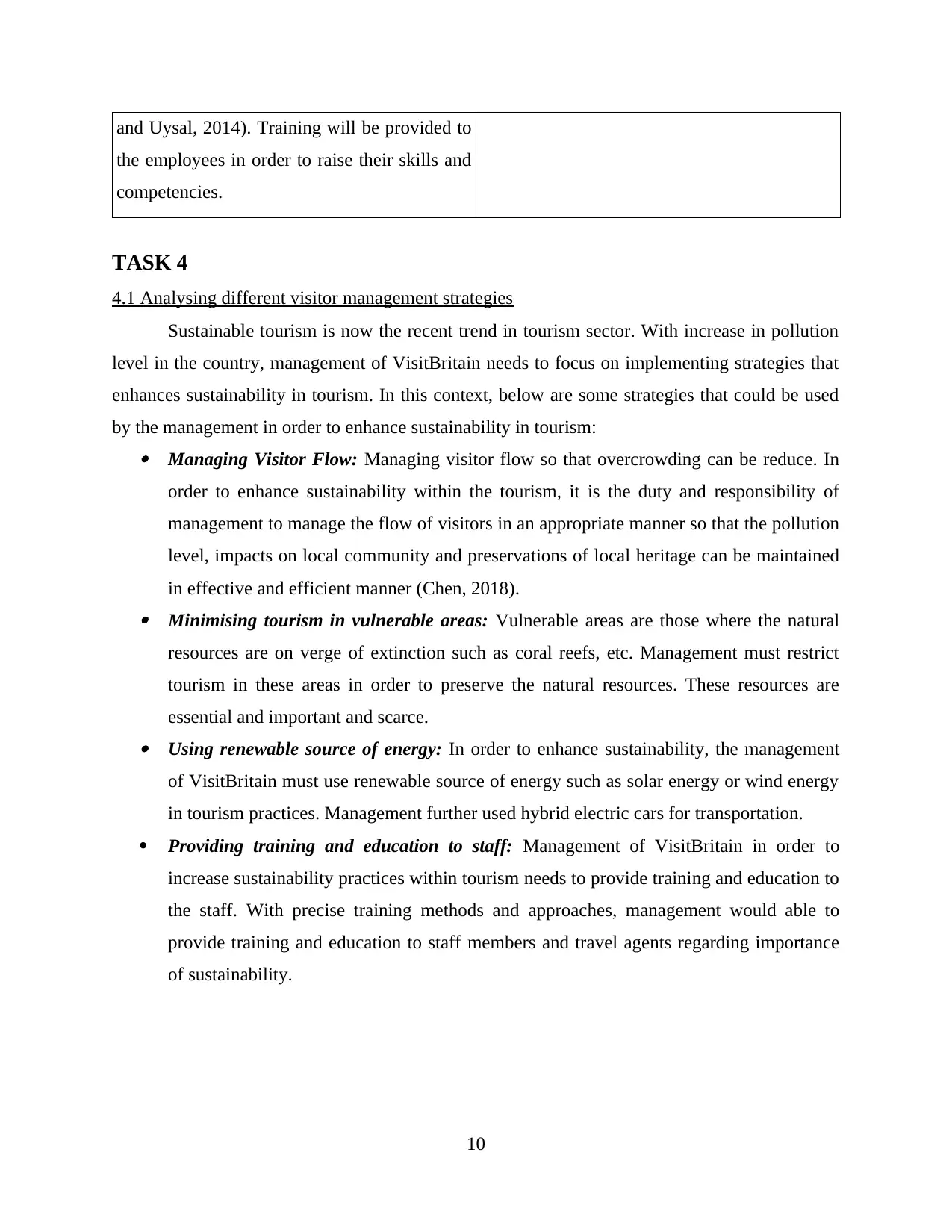
and Uysal, 2014). Training will be provided to
the employees in order to raise their skills and
competencies.
TASK 4
4.1 Analysing different visitor management strategies
Sustainable tourism is now the recent trend in tourism sector. With increase in pollution
level in the country, management of VisitBritain needs to focus on implementing strategies that
enhances sustainability in tourism. In this context, below are some strategies that could be used
by the management in order to enhance sustainability in tourism: Managing Visitor Flow: Managing visitor flow so that overcrowding can be reduce. In
order to enhance sustainability within the tourism, it is the duty and responsibility of
management to manage the flow of visitors in an appropriate manner so that the pollution
level, impacts on local community and preservations of local heritage can be maintained
in effective and efficient manner (Chen, 2018). Minimising tourism in vulnerable areas: Vulnerable areas are those where the natural
resources are on verge of extinction such as coral reefs, etc. Management must restrict
tourism in these areas in order to preserve the natural resources. These resources are
essential and important and scarce. Using renewable source of energy: In order to enhance sustainability, the management
of VisitBritain must use renewable source of energy such as solar energy or wind energy
in tourism practices. Management further used hybrid electric cars for transportation.
Providing training and education to staff: Management of VisitBritain in order to
increase sustainability practices within tourism needs to provide training and education to
the staff. With precise training methods and approaches, management would able to
provide training and education to staff members and travel agents regarding importance
of sustainability.
10
the employees in order to raise their skills and
competencies.
TASK 4
4.1 Analysing different visitor management strategies
Sustainable tourism is now the recent trend in tourism sector. With increase in pollution
level in the country, management of VisitBritain needs to focus on implementing strategies that
enhances sustainability in tourism. In this context, below are some strategies that could be used
by the management in order to enhance sustainability in tourism: Managing Visitor Flow: Managing visitor flow so that overcrowding can be reduce. In
order to enhance sustainability within the tourism, it is the duty and responsibility of
management to manage the flow of visitors in an appropriate manner so that the pollution
level, impacts on local community and preservations of local heritage can be maintained
in effective and efficient manner (Chen, 2018). Minimising tourism in vulnerable areas: Vulnerable areas are those where the natural
resources are on verge of extinction such as coral reefs, etc. Management must restrict
tourism in these areas in order to preserve the natural resources. These resources are
essential and important and scarce. Using renewable source of energy: In order to enhance sustainability, the management
of VisitBritain must use renewable source of energy such as solar energy or wind energy
in tourism practices. Management further used hybrid electric cars for transportation.
Providing training and education to staff: Management of VisitBritain in order to
increase sustainability practices within tourism needs to provide training and education to
the staff. With precise training methods and approaches, management would able to
provide training and education to staff members and travel agents regarding importance
of sustainability.
10
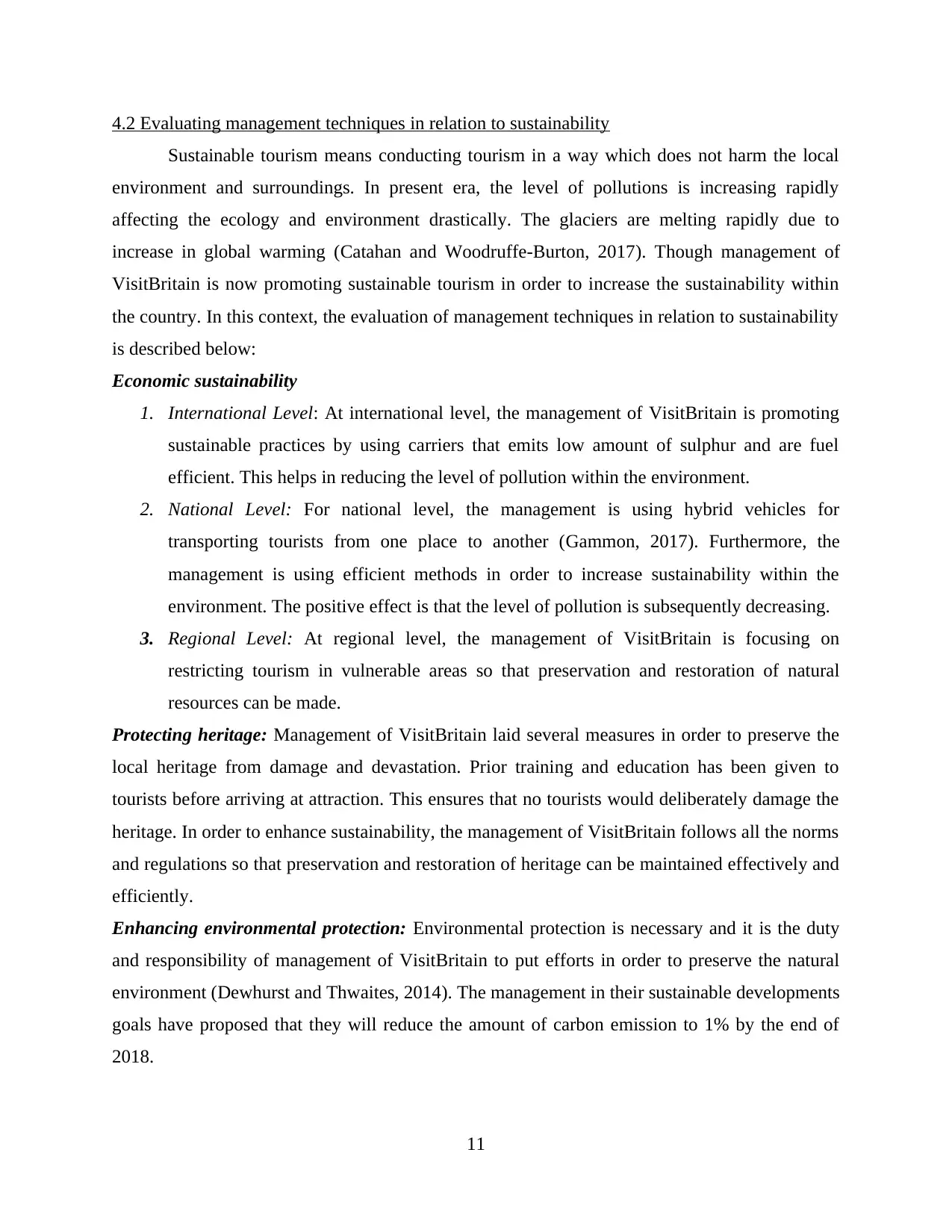
4.2 Evaluating management techniques in relation to sustainability
Sustainable tourism means conducting tourism in a way which does not harm the local
environment and surroundings. In present era, the level of pollutions is increasing rapidly
affecting the ecology and environment drastically. The glaciers are melting rapidly due to
increase in global warming (Catahan and Woodruffe-Burton, 2017). Though management of
VisitBritain is now promoting sustainable tourism in order to increase the sustainability within
the country. In this context, the evaluation of management techniques in relation to sustainability
is described below:
Economic sustainability
1. International Level: At international level, the management of VisitBritain is promoting
sustainable practices by using carriers that emits low amount of sulphur and are fuel
efficient. This helps in reducing the level of pollution within the environment.
2. National Level: For national level, the management is using hybrid vehicles for
transporting tourists from one place to another (Gammon, 2017). Furthermore, the
management is using efficient methods in order to increase sustainability within the
environment. The positive effect is that the level of pollution is subsequently decreasing.
3. Regional Level: At regional level, the management of VisitBritain is focusing on
restricting tourism in vulnerable areas so that preservation and restoration of natural
resources can be made.
Protecting heritage: Management of VisitBritain laid several measures in order to preserve the
local heritage from damage and devastation. Prior training and education has been given to
tourists before arriving at attraction. This ensures that no tourists would deliberately damage the
heritage. In order to enhance sustainability, the management of VisitBritain follows all the norms
and regulations so that preservation and restoration of heritage can be maintained effectively and
efficiently.
Enhancing environmental protection: Environmental protection is necessary and it is the duty
and responsibility of management of VisitBritain to put efforts in order to preserve the natural
environment (Dewhurst and Thwaites, 2014). The management in their sustainable developments
goals have proposed that they will reduce the amount of carbon emission to 1% by the end of
2018.
11
Sustainable tourism means conducting tourism in a way which does not harm the local
environment and surroundings. In present era, the level of pollutions is increasing rapidly
affecting the ecology and environment drastically. The glaciers are melting rapidly due to
increase in global warming (Catahan and Woodruffe-Burton, 2017). Though management of
VisitBritain is now promoting sustainable tourism in order to increase the sustainability within
the country. In this context, the evaluation of management techniques in relation to sustainability
is described below:
Economic sustainability
1. International Level: At international level, the management of VisitBritain is promoting
sustainable practices by using carriers that emits low amount of sulphur and are fuel
efficient. This helps in reducing the level of pollution within the environment.
2. National Level: For national level, the management is using hybrid vehicles for
transporting tourists from one place to another (Gammon, 2017). Furthermore, the
management is using efficient methods in order to increase sustainability within the
environment. The positive effect is that the level of pollution is subsequently decreasing.
3. Regional Level: At regional level, the management of VisitBritain is focusing on
restricting tourism in vulnerable areas so that preservation and restoration of natural
resources can be made.
Protecting heritage: Management of VisitBritain laid several measures in order to preserve the
local heritage from damage and devastation. Prior training and education has been given to
tourists before arriving at attraction. This ensures that no tourists would deliberately damage the
heritage. In order to enhance sustainability, the management of VisitBritain follows all the norms
and regulations so that preservation and restoration of heritage can be maintained effectively and
efficiently.
Enhancing environmental protection: Environmental protection is necessary and it is the duty
and responsibility of management of VisitBritain to put efforts in order to preserve the natural
environment (Dewhurst and Thwaites, 2014). The management in their sustainable developments
goals have proposed that they will reduce the amount of carbon emission to 1% by the end of
2018.
11
Paraphrase This Document
Need a fresh take? Get an instant paraphrase of this document with our AI Paraphraser
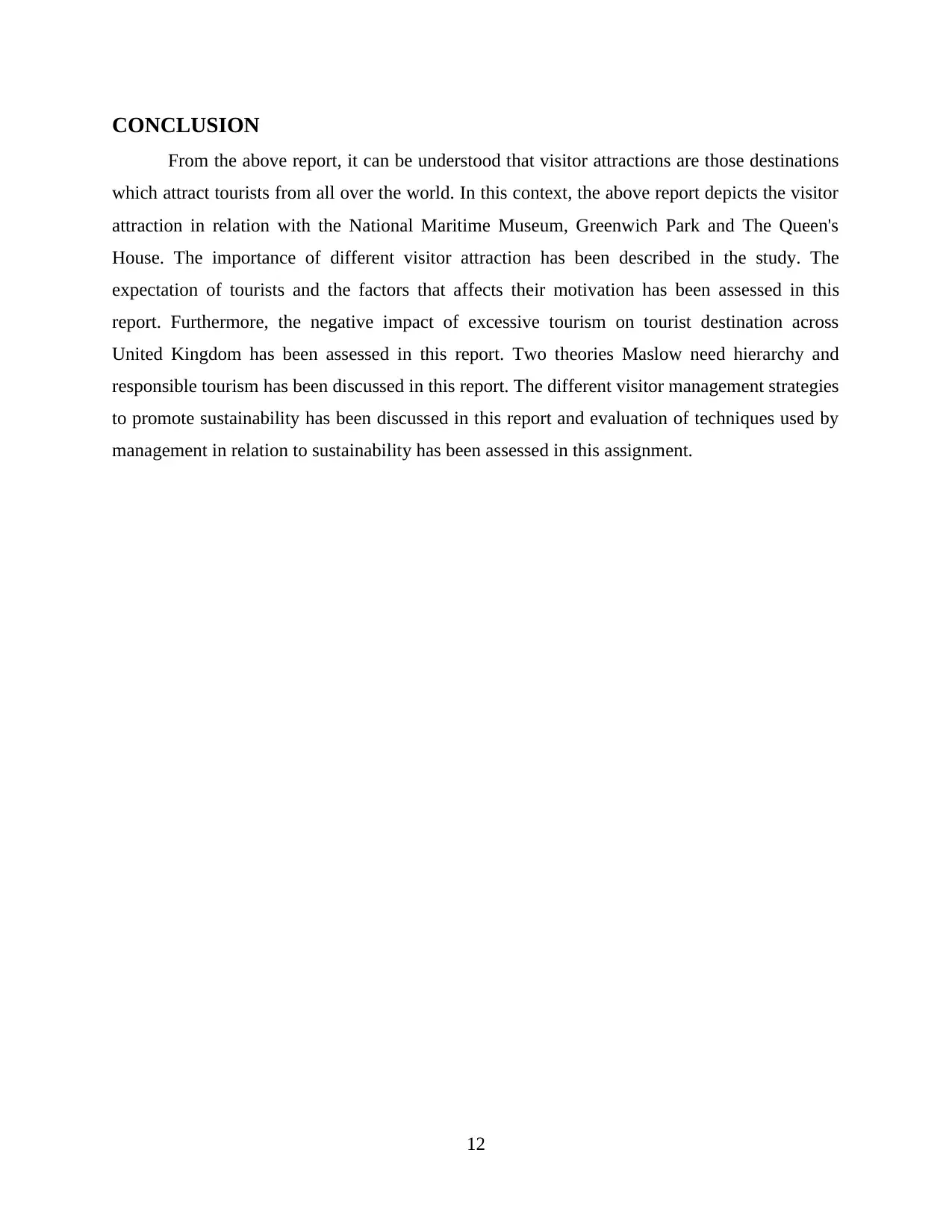
CONCLUSION
From the above report, it can be understood that visitor attractions are those destinations
which attract tourists from all over the world. In this context, the above report depicts the visitor
attraction in relation with the National Maritime Museum, Greenwich Park and The Queen's
House. The importance of different visitor attraction has been described in the study. The
expectation of tourists and the factors that affects their motivation has been assessed in this
report. Furthermore, the negative impact of excessive tourism on tourist destination across
United Kingdom has been assessed in this report. Two theories Maslow need hierarchy and
responsible tourism has been discussed in this report. The different visitor management strategies
to promote sustainability has been discussed in this report and evaluation of techniques used by
management in relation to sustainability has been assessed in this assignment.
12
From the above report, it can be understood that visitor attractions are those destinations
which attract tourists from all over the world. In this context, the above report depicts the visitor
attraction in relation with the National Maritime Museum, Greenwich Park and The Queen's
House. The importance of different visitor attraction has been described in the study. The
expectation of tourists and the factors that affects their motivation has been assessed in this
report. Furthermore, the negative impact of excessive tourism on tourist destination across
United Kingdom has been assessed in this report. Two theories Maslow need hierarchy and
responsible tourism has been discussed in this report. The different visitor management strategies
to promote sustainability has been discussed in this report and evaluation of techniques used by
management in relation to sustainability has been assessed in this assignment.
12
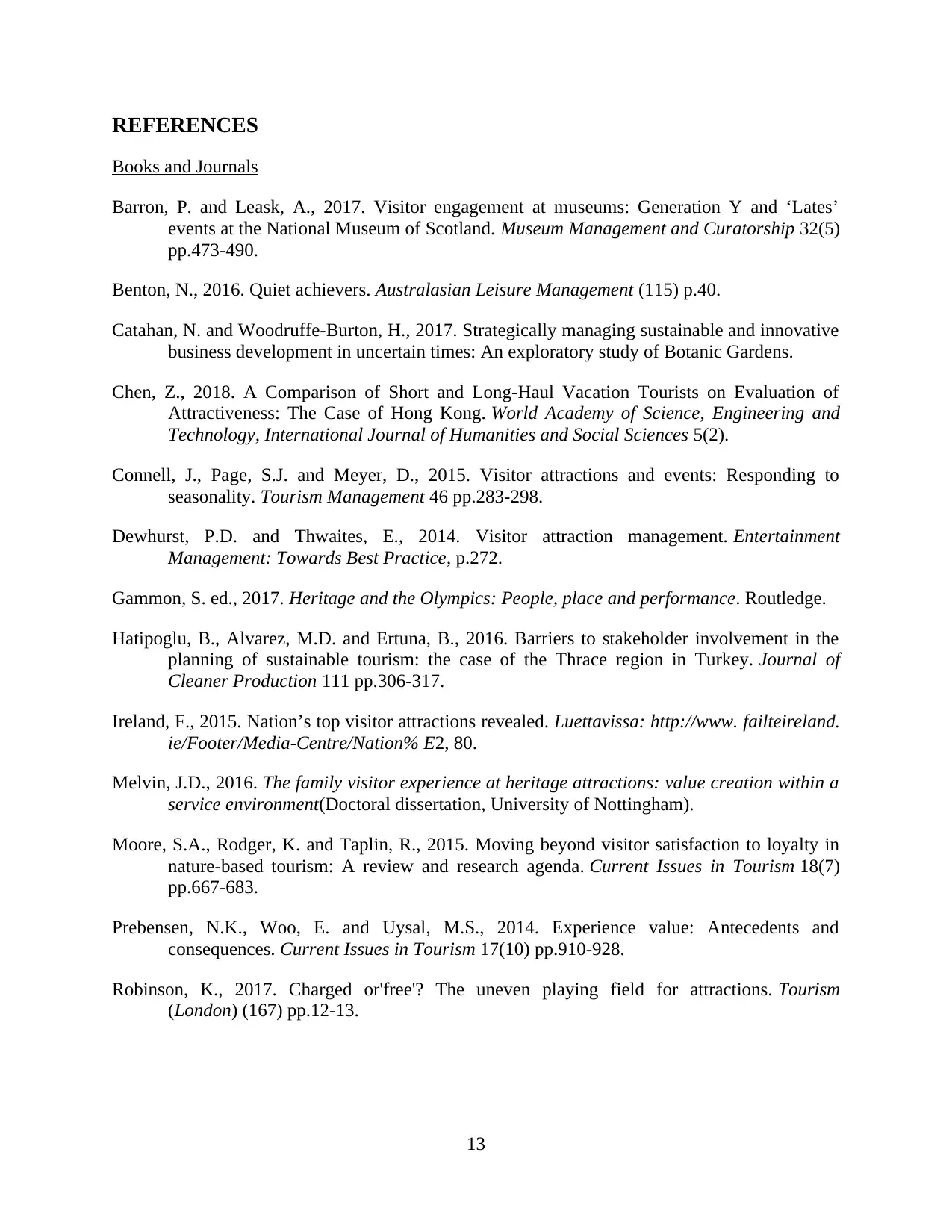
REFERENCES
Books and Journals
Barron, P. and Leask, A., 2017. Visitor engagement at museums: Generation Y and ‘Lates’
events at the National Museum of Scotland. Museum Management and Curatorship 32(5)
pp.473-490.
Benton, N., 2016. Quiet achievers. Australasian Leisure Management (115) p.40.
Catahan, N. and Woodruffe-Burton, H., 2017. Strategically managing sustainable and innovative
business development in uncertain times: An exploratory study of Botanic Gardens.
Chen, Z., 2018. A Comparison of Short and Long-Haul Vacation Tourists on Evaluation of
Attractiveness: The Case of Hong Kong. World Academy of Science, Engineering and
Technology, International Journal of Humanities and Social Sciences 5(2).
Connell, J., Page, S.J. and Meyer, D., 2015. Visitor attractions and events: Responding to
seasonality. Tourism Management 46 pp.283-298.
Dewhurst, P.D. and Thwaites, E., 2014. Visitor attraction management. Entertainment
Management: Towards Best Practice, p.272.
Gammon, S. ed., 2017. Heritage and the Olympics: People, place and performance. Routledge.
Hatipoglu, B., Alvarez, M.D. and Ertuna, B., 2016. Barriers to stakeholder involvement in the
planning of sustainable tourism: the case of the Thrace region in Turkey. Journal of
Cleaner Production 111 pp.306-317.
Ireland, F., 2015. Nation’s top visitor attractions revealed. Luettavissa: http://www. failteireland.
ie/Footer/Media-Centre/Nation% E2, 80.
Melvin, J.D., 2016. The family visitor experience at heritage attractions: value creation within a
service environment(Doctoral dissertation, University of Nottingham).
Moore, S.A., Rodger, K. and Taplin, R., 2015. Moving beyond visitor satisfaction to loyalty in
nature-based tourism: A review and research agenda. Current Issues in Tourism 18(7)
pp.667-683.
Prebensen, N.K., Woo, E. and Uysal, M.S., 2014. Experience value: Antecedents and
consequences. Current Issues in Tourism 17(10) pp.910-928.
Robinson, K., 2017. Charged or'free'? The uneven playing field for attractions. Tourism
(London) (167) pp.12-13.
13
Books and Journals
Barron, P. and Leask, A., 2017. Visitor engagement at museums: Generation Y and ‘Lates’
events at the National Museum of Scotland. Museum Management and Curatorship 32(5)
pp.473-490.
Benton, N., 2016. Quiet achievers. Australasian Leisure Management (115) p.40.
Catahan, N. and Woodruffe-Burton, H., 2017. Strategically managing sustainable and innovative
business development in uncertain times: An exploratory study of Botanic Gardens.
Chen, Z., 2018. A Comparison of Short and Long-Haul Vacation Tourists on Evaluation of
Attractiveness: The Case of Hong Kong. World Academy of Science, Engineering and
Technology, International Journal of Humanities and Social Sciences 5(2).
Connell, J., Page, S.J. and Meyer, D., 2015. Visitor attractions and events: Responding to
seasonality. Tourism Management 46 pp.283-298.
Dewhurst, P.D. and Thwaites, E., 2014. Visitor attraction management. Entertainment
Management: Towards Best Practice, p.272.
Gammon, S. ed., 2017. Heritage and the Olympics: People, place and performance. Routledge.
Hatipoglu, B., Alvarez, M.D. and Ertuna, B., 2016. Barriers to stakeholder involvement in the
planning of sustainable tourism: the case of the Thrace region in Turkey. Journal of
Cleaner Production 111 pp.306-317.
Ireland, F., 2015. Nation’s top visitor attractions revealed. Luettavissa: http://www. failteireland.
ie/Footer/Media-Centre/Nation% E2, 80.
Melvin, J.D., 2016. The family visitor experience at heritage attractions: value creation within a
service environment(Doctoral dissertation, University of Nottingham).
Moore, S.A., Rodger, K. and Taplin, R., 2015. Moving beyond visitor satisfaction to loyalty in
nature-based tourism: A review and research agenda. Current Issues in Tourism 18(7)
pp.667-683.
Prebensen, N.K., Woo, E. and Uysal, M.S., 2014. Experience value: Antecedents and
consequences. Current Issues in Tourism 17(10) pp.910-928.
Robinson, K., 2017. Charged or'free'? The uneven playing field for attractions. Tourism
(London) (167) pp.12-13.
13
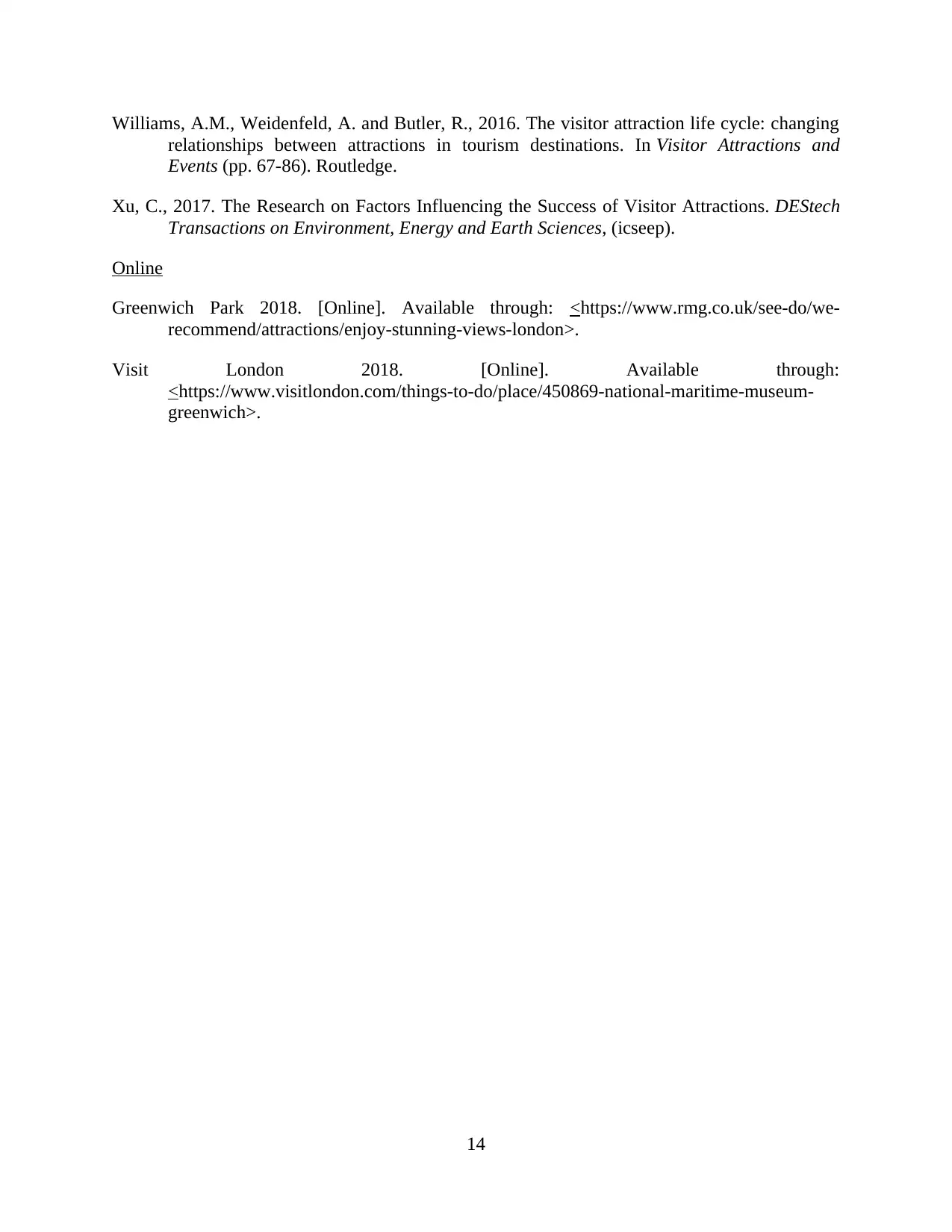
Williams, A.M., Weidenfeld, A. and Butler, R., 2016. The visitor attraction life cycle: changing
relationships between attractions in tourism destinations. In Visitor Attractions and
Events (pp. 67-86). Routledge.
Xu, C., 2017. The Research on Factors Influencing the Success of Visitor Attractions. DEStech
Transactions on Environment, Energy and Earth Sciences, (icseep).
Online
Greenwich Park 2018. [Online]. Available through: <https://www.rmg.co.uk/see-do/we-
recommend/attractions/enjoy-stunning-views-london>.
Visit London 2018. [Online]. Available through:
<https://www.visitlondon.com/things-to-do/place/450869-national-maritime-museum-
greenwich>.
14
relationships between attractions in tourism destinations. In Visitor Attractions and
Events (pp. 67-86). Routledge.
Xu, C., 2017. The Research on Factors Influencing the Success of Visitor Attractions. DEStech
Transactions on Environment, Energy and Earth Sciences, (icseep).
Online
Greenwich Park 2018. [Online]. Available through: <https://www.rmg.co.uk/see-do/we-
recommend/attractions/enjoy-stunning-views-london>.
Visit London 2018. [Online]. Available through:
<https://www.visitlondon.com/things-to-do/place/450869-national-maritime-museum-
greenwich>.
14
1 out of 16
Related Documents
Your All-in-One AI-Powered Toolkit for Academic Success.
+13062052269
info@desklib.com
Available 24*7 on WhatsApp / Email
![[object Object]](/_next/static/media/star-bottom.7253800d.svg)
Unlock your academic potential
© 2024 | Zucol Services PVT LTD | All rights reserved.





